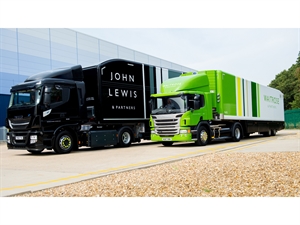John Lewis to build biomethane filling station as it transitions to low emission trucks
Thu 18 June 2020
View all news

The John Lewis Partnership has announced plans to build a dedicated biomethane gas filling station near its HQ in Bracknell to enable its largest heavy goods vehicles to use a low carbon alternative to diesel. John Lewis has also revealed an ambition to stop using fossil fuels across its entire 4,800 strong transport fleet by 2030.
The new biomethane gas filling station will be built in conjunction with Air Liquide. It will facilitate the conversion of the Bracknell Waitrose fleet to biomethane and complement gas filling stations already in use near to John Lewis and Waitrose regional distribution centres in Leyland, Lancashire, and in Northampton.
Serving approximately 120 Waitrose heavy goods trucks, the vehicles will run on biomethane made from food waste and food processing waste materials rather than diesel.
Since 2015, 85 of the Partnership’s heavy diesel vehicles have already been replaced with biomethane trucks, and a further 143 will be purchased and in operation by the end of 2020, making this the largest order of biomethane trucks in the UK.
In March 2019, the employee-owned business pledged to be net zero carbon across its entire operations by 2050 at the latest and its 600 heavy goods vehicles to be switched to low carbon biomethane by 2028. Since 2019, the Partnership has reduced its total operational carbon emissions by 6.6%2 and emissions from transport have fallen by 6.9%.
The John Lewis Partnership says its ambition is to eliminate fossil fuels from its commercial vehicle and car fleet by 2030. This could see 1,750 electric vans and light trucks introduced and approximately 750 refrigerated trailers converted from diesel to electric drive. In addition, the Partnership’s 1,300 strong car fleet would become 100% electric and any remaining vehicles that could not be converted to biomethane or electric will use hydrotreated vegetable oil (HVO) biodiesel.
Justin Laney, Partner & General Manager of Central Transport at the John Lewis Partnership - and a member of LowCVP's Board of Directors - said: “The evidence of climate change is all around us, so it’s important we act now using available technology rather than wait for unproven solutions to appear. We are working hard towards our new aim of removing all fossil fuel from our transport fleet by 2030, which will reduce our carbon emissions by over half a million tonnes and gets us well on the way to our ultimate target of operating a net zero carbon emission fleet.”
Note: Justin Laney will be a speaker at the LowCVP Annual Conference on July 15
Related Links
< Back to news list